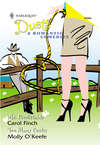Buch lesen: «Undercover Protector»
“Nothing like a little excitement in the middle of the day.”
As Caleb spoke over the sound of the smoke detector blaring, he looked at Maggie. His eyes were penetrating, piercing as though she were smoke he was trying to see through.
“So tell me, Marg–”
She put her fist to her mouth and coughed in a desperate and hackneyed effort to stop him from asking about her. If he started probing Margaret’s life, she’d probably tell him the truth about herself.
“Are you OK?” His concern was real and she felt the bite of guilt she always experienced when a subject expressed concern over her faked moments of weakness.
This was no different. In fact, seeing the worry in his blue eyes was worse. I gotta get out of this job, she thought. Caleb Gomez is going to be the last person I trick. The last person I lie to and hurt.
MOLLY O’KEEFE
has been enjoying her new quasi-hermit lifestyle as a mum and writer in Toronto, Canada. In an effort to make sure she isn’t as much of a recluse as Caleb Gomez, she does force herself out of the home for lattes and scones. It’s a rough life. She loves hearing from readers, so drop her a line at www.molly-okeefe.com.
Undercover Protector
MOLLY O’KEEFE
For Wanda Ottewell. I can’t thank you enough
for everything you’ve taught me.
You’re amazing.
PROLOGUE
“JEFE!”
The door to Benny Delgado’s office crashed open and ricocheted off the cheap wood paneling on the wall behind it.
Benny’s semiautomatic was in his hand, safety off and aimed at the intruder’s heart before the walls stopped trembling.
“Jesus,” Benny sighed when he realized whom he nearly killed.
His younger brother, Miguel, stood in the doorway like a dog waiting to come in. “Sorry, jefe, but—”
“The door was shut, Miguel,” Benny said, laying the gun back on the desk.
“I know, but you need—”
“The door was shut.” He folded the Los Angeles Times crossword puzzle he’d been doing and arched an eyebrow at his little brother.
Miguel twitched and cracked the knuckles on his right hand, clearly worked up about something, which was odd for Miguel. He was usually too high to get agitated about anything. But whatever was wrong, there was no reason to break the one damn rule Benny insisted on.
When the door was shut, Miguel was supposed to knock.
The rule was put into effect during a particularly nasty period when one of his soldiers was suspected of cooperating with federal agents.
Benny tried to protect his brother from the bloodier aspects of the business.
Finally, Miguel sighed heavily, stepped back and knocked on the open door. “There’s something on the news you gotta see.”
It was their mother’s fault, Benny thought. She’d babied Miguel, allowed too many weaknesses to grow underneath the profile that was so much like her long-dead husband’s.
Benny, she always said, looked like a mongrel. Bits and pieces of no one in particular—a fact that had never inspired much maternal devotion.
In the end he was better for it. Stronger than his beautiful brother.
“This better not be an excuse to get the Lakers’ score on my TV.” Benny reached over to the remote control at his elbow and turned on the giant flat-screen monitor on the other side of the room.
“It’s not.” Miguel came to stand beside Benny’s desk.
“What are you doing watching the news, anyway?” Benny asked, looking at his brother from the corner of his eye. Miguel wore the white tank top and oversize khaki work pants that were the uniform for Chicano street thugs in Los Angeles.
Benny had stopped dressing the part of a petty criminal years ago; looking like a thug raised too many red flags for the cops. And once he stopped being a petty criminal, he could no longer afford the attention.
“Lita was watching it. Turn up the volume, jefe. Jesus, you got enough stereo equipment to blow the roof off.” Miguel pointed to the flat-screen TV and high-tech stereo equipment that stood out like a shiny technological thumb in the dumpy room. “You could at least listen to it.”
Benny could afford better than this crappy house—with its water-stained ceilings and fraying carpet—in Long Beach where his mother grew up, but he liked it here. He had grown up here, was safe here.
“Channel twenty-four,” Miguel said. He crossed his arms over his chest and tucked his hands into his armpits. “They been talkin’ about it every fifteen minutes.”
Benny changed the channel and turned up the volume so he could hear the special report, wondering what it was that inspired Miguel to watch the news.
“—the American journalist who was held hostage in Baghdad then rescued in a daring prison break that cost the lives of three American soldiers, is being released from the hospital today,” the blond anchorwoman with the great tits said. “Caleb Gomez—”
A photo of a good-looking man with dark skin and blue eyes flashed on the screen and Benny’s body went cold.
“See? Isn’t that—?”
Benny held up his hand and his brother quieted. Transfixed by the image of the Hispanic man on the screen, Benny stood and walked around his desk.
“Gomez was in a coma for three months following his rescue from the Iraqi prison,” the blonde said as pictures of a single-story building the color of sand and surrounded by Iraqi soldiers replaced those of the handsome man. “The tape of his captors holding a knife to his neck demanding the withdrawal of U.S. troops from Iraq circulated the world last spring—”
The picture of the prison was replaced by a far more grainy shot of a soldier holding a long knife to the throat of a bearded, blindfolded man.
Benny had seen the picture a million times, just like the rest of the world. But now, even without seeing the man’s eyes, the prisoner seemed familiar. The way he sat, so proud, his lips twisted in what Benny knew was anger. It was so like the man he had befriended a little more than three years ago. The man who, shortly thereafter, had disappeared off the face of the earth.
“Gomez was kidnapped by Iraqi soldiers while covering the war for the Los Angeles Times—”
“Benny? That’s him…that’s Ruben, isn’t it?” Miguel asked. “He’s been in Iraq? What’s this mean?”
Journalist? Benny’s brain screamed. He’s a freaking journalist? All of those conversations. The things Benny had told Ruben, believing he had finally found a thinking man amongst all of the thugs and butchers of his world. The man Benny had trusted with secrets was a journalist?
When Ruben had disappeared, Benny had thought for a while that Ruben had been an undercover cop. Or a Fed. But when no harassment or raids had followed he figured him for one of those nameless dead spics found in the mountains.
He’d been wrong.
His hands spasmed into fists, the edges of the remote cut into his palm.
“Gomez won a Pulitzer four years ago for his exposé of the meat-packing industry,” the blonde continued. “Many experts say his work from Iraq would have garnered him another award. Gomez was released from the naval hospital in San Diego today. He plans to recover in privacy in New York City.”
Benny’s brain went cold then hot.
Everything was at stake. All he’d done. It could all be taken away from him if that journalist opened his mouth.
“That’s Ruben, isn’t it?” Miguel asked. “That journalist. Did you know he was a reporter?”
Benny shook his head. Rage caught fire in his gut—blind and hot and merciless. His chest heaved and he fisted his hands in his hair. He paced between the couch and his desk. He’d been fooled. Him. Benny Delgado.
Benny knew this journalist—this Caleb Gomez—as Ruben Villalobos. Three years ago his sister, Lita, had started bringing her latest boyfriend, Ruben, around the house. Benny had liked Ruben. Respected him. He’d tried to recruit him, but Ruben had resisted and Benny kind of respected that. They’d smoked joints in the backyard and talked about their dead mothers.
“Damn it!” he screamed and shoved over one of the folding chairs in front of his desk. He picked up the other one and hurled it across the room at the TV screen.
Sparks crackled in the dead air.
Gomez knew things about him. Things he had been keeping secret. Things that kept him safe. If that hibrido were to write a story about him now…
“The news said he’d be in New York City.” Miguel stepped forward and Benny started shaking his head, knowing by the wild hot look in his brother’s eyes what he wanted.
“No, Miguel.” Benny put up his hand, stopping Miguel’s advance.
“Why not?” Miguel asked. “You need to send someone, why can’t I go?”
“You want to go do what has to be done?” Benny asked, anger churning hard through his body. “You want to be the man to slit that reporter’s throat?”
Miguel’s chin went up. “Yes, jefe.”
Benny looked at his brother and saw only the mistakes. The drug use. The gambling. The soft heart and softer head.
“No way.”
“Benny, this guy could screw up the meeting with that ambassador. That Reyes guy. I know—”
Benny worked hard to control his expression, to smother the surprise and outrage. Everyone in his organization knew they were not supposed to tell Miguel these things. Miguel ran some drugs. Kept track of some books. He was not supposed to know about Reyes or the meeting.
“You don’t know anything.” Benny shook his head.
“I’m your brother, but you don’t trust me.” Miguel’s dark eyes turned liquid, a trick that used to work on Benny the way it worked on their mother.
Not with this. Not ever with this.
“You’re my brother,” he said instead, clapping a hand on Miguel’s neck and squeezing. “I can’t risk you. The cops. The Feds. You get caught and it’s me who goes to jail.”
“Sooner or later, brother, you are going to have to treat me like a man,” Miguel said, shrugging away from Benny’s hand, like a sullen teenager rather than the man he wanted to be.
Not until you act like one.
“You are a man,” he pacified his brother. “But you are my brother first.”
“What are you going to do?” Miguel asked. “What if this guy talks? What if—”
“I can fix this,” Benny said. The way he fixed that female witness and the cop six months ago.
He had to deal with Ruben—He shook his head. There was no Ruben, never had been. There was only a reporter named Caleb Gomez who had to die, fast, before he had a chance to open his mouth. Before the meeting with Reyes in a month.
First Benny would have a little talk with his sister and then he would send some men to New York.
CHAPTER ONE
“THANKS, GORDON.” Maggie Fitzgerald took the cup of coffee from her favorite techie’s hand and weighed the pleasure against the pain of taking a sip.
Her doctor said she should cut back on the caffeine if she ever wanted to get rid of her ulcers. But the smell of coffee—even the crappy stuff from the bakery on the corner—was too much to resist. She tore open the small square on the plastic lid and took a sip.
She was so used to her ulcers at this stage, what would be the point of getting rid of them?
Gordon collapsed into the stiff reception chair beside hers and stared at Deputy Walters’ closed office door.
“So.” Gordon yawned but talked through it. “Why do you suppose we got the royal summons at 6 a.m. on a Saturday?”
“Your guess is as good as mine,” Maggie said, watching the steam escape from the coffee cup.
“You’re lying.” Gordon gestured with his cup and coffee sloshed over onto his brown corduroy pants. “You are totally lying.”
Gordon was the best surveillance tech she’d ever worked with and he was—in certain lighting and on special occasions—vaguely loveable. But not so much this early on a Saturday morning.
“What makes you say that?” She took another sip of sugary coffee. She was lying. She did have an idea why they were here. But she wasn’t about to share that with Gordon.
“’Cause you always know more than you let on.” Gordon shrugged and slumped deeper into his chair. “When you’re not around the guys in bank robbery call you the freaking Cheshire Cat.”
“I think I’ll take that as a compliment.” It was, after all, better than some of the things she’d been called since entering the hallowed halls of Quantico four years ago.
“You think it’s got anything to do with your brother?” Gordon asked.
“No.” Her voice was cold, her heart colder. “I don’t think it has anything to do with my brother.”
“But with Delgado—”
“I don’t think it has anything to do with Patrick.” She looked at Gordon, feeling the bite of anger and grief that she’d been fighting since the accident six months ago.
She was getting better. Most of the time those emotions only surfaced at night—in disjointed dreams of her brother lost and cold someplace and her unable to find him. But sometimes she was ambushed by her feelings, caught unawares by the terrible reality that Patrick was dead. Gone.
Murdered.
“Okay.” Gordon raised his hands in truce. “But I think you’re wrong.”
Maggie didn’t say anything and they drank in stiff, uncomfortable silence.
“Whatever it is I hope I’m being reassigned to the Delgado task force. I’ve had it about up to here—” he held his hand about a foot over his head “—with bank robberies and celebrity stalkings.”
Maggie smiled. They were in L.A., after all. Celebrity stalking, bank robberies and gangs composed about seventy-five percent of the workload.
“How is it over at gang violence?” Gordon asked. “Better?”
“I wouldn’t say better. I’d just say less mundane.”
He nodded his head. “I like less mundane. But since your brother got killed and that witness—”
“Gordon,” she said through tight lips, “shut up.”
“Right. Shutting up.”
She had the sinking fear that Gordon was right. She was here because of her brother. Maybe she would be removed from the Delgado case because of the media coverage surrounding Patrick’s death.
Nothing like a few headlines shouting Dirty Cop or, worse, Dead Cop Linked to Drug Lord to sully a whole family’s name. No matter if they were true or not.
“Hey, did you see the Lakers game yesterday? I swear I keep betting on the wrong team—”
Luckily, Gordon’s small talk was cut short by the sudden opening of Deputy Walters’ door.
Curtis Johnson, the agent in charge of the Delgado task force and the closest thing she had to a mentor in the Bureau, stood in the doorway like a huge black shadow in an ill-fitting suit.
“Come on in,” he said in his deep baritone that sounded like the voice of God in the cartoons Maggie had watched as a kid. Gordon leaped up and Curtis stepped out of the way as Gordon walked past him. Maggie took her time, trying to catch Curtis’s eye before going in those doors, but she couldn’t discern anything from his locked-down expression.
Her ulcers didn’t like this one bit.
“Relax,” Curtis whispered as she walked by.
“Easier said than done,” she whispered back.
Curtis chuckled and followed her into Deputy Walters’s inner sanctum.
Maggie took a deep breath and pulled the loose collar away from her throat. The oak paneling and oil paintings seemed to close in on her with every breath. Her father had this dream of her being the first female assistant deputy director of the West Coast Bureau, but if that meant working in this ever-shrinking room every day, dear old Dad could forget it.
Deputy Walters was a small man who looked far younger than his years and much too young to be the assistant deputy director in charge. He was dwarfed by the large oak desk he sat behind, which Gordon loved to make penis compensation jokes about. But there was no joking about this meeting.
Walters had held his position for five years and in the year since the Bureau had put Delgado on the Ten Most Wanted list, Walters had already gone through two agents in charge. Flores and Smyth hadn’t managed to bring down Delgado and were now fielding bomb threats and UFO sightings at their desks.
Curtis had been put in charge a month ago and she’d been angling to get on his team from the start. Two weeks ago, he’d brought her on board. And so far she’d turned up nothing. Trying to get information on Delgado was like running into a brick wall headfirst. No one in the neighborhoods would talk. No one in jail would talk. They’d offered one convict reduced jail time on a twenty-five year sentence and the guy wouldn’t budge.
I’ll take the time, he’d said. Better alive in jail than dead on the street.
They had thrown in relocation and protection to sweeten the deal, but he’d only scoffed. You can’t take me where Delgado won’t find me.
Delgado ruled his syndicate with fear and brutal violence. Anyone even suspected of talking to the Feds was killed, their families were killed, their dogs were killed.
So far it had been a pretty effective deterrent.
“Have a seat,” Walters said with a smile that was about as warm as an ice bath. She and Gordon sat in the chairs across from him and Curtis stood to the right of the phallic desk.
“What’s going on?” Gordon asked, his eyes darting between Walters and Curtis.
“Delgado is on the move,” Curtis replied.
He turned and hit a button on his remote and the screen on the right wall was illuminated with the face of the handsome Hispanic man who’d been all over the newspapers and television in the past few days.
“Caleb Gomez was released from the naval hospital in San Diego four days ago,” Curtis said and Maggie sat back, wondering what a Pulitzer-prize winning hostage survivor had to do with one of the most brutal gang lords in Los Angeles. “According to his press release, he is planning to spend time recuperating in New York City.”
Curtis clicked the remote and a bad surveillance photo of Gomez dressed out like an East L. A. native standing in front of a taco stand with Delgado filled the screen.
“What’s Delgado doing with a journalist?” Gordon voiced Maggie’s thoughts. “That’s like suicide for Delgado.”
“Or the journalist,” Maggie added.
“That’s what we’re wondering, too,” Curtis said and jerked his thumb toward the screen. “This photo was taken three and a half years ago. According to Gomez’s editor at the Los Angeles Times, that’s about when Gomez stopped taking assignments and was working on what he called his ‘next Pulitzer.’ The Times had commissioned Gomez’s mystery story to run in the fall of 2003, but when Iraq really started heating up, Gomez requested to be embedded with the troops near Baghdad. He spent the better part of two and a half years over there before the kidnapping.” He shrugged, a nervous tick he had, as though he was uncomfortable in his skin and constantly wanted out. “The details of what happened to him there will be in your files.”
Maggie swallowed. The whole world knew many of those details—he’d been brutalized over there. Beaten. Tortured. For three days.
But their files would hold classified—and much more grisly—information, thanks to the military and medical personnel who had assisted in Gomez’s escape and recovery.
Her stomach turned.
Professional detachment could only take you so far in the face of the evil man could do.
“You think he infiltrated the Delgado gang?” she asked, shoving thoughts of torture aside. “You think that was his mystery story?”
“Three years ago, Delgado was just entering our radar. It was before he murdered Hernandez and took over his syndicate in East L. A.” Curtis shrugged a massive shoulder and clicked ahead to the next photo. A closer image of Gomez and Delgado in front of the taco stand. Delgado was clearly smiling at something Gomez was saying. “Delgado was far more accessible then. He was just a soldier in the Hernandez syndicate. If a good journalist was going to get in on the ground floor, that would have been the time to do it.”
“Good and crazy,” Gordon muttered and Maggie had to agree, but things still didn’t add up.
“That’s a huge conclusion to jump to,” Maggie said. “Maybe they just happened to be in line together at a taco stand.”
“Well.” Curtis grinned like the Cheshire Cat her colleagues claimed she was and clicked onto the next image—mug shots of two of Delgado’s top men. “Hernando and Boyer were spotted in New York City yesterday outside of the apartment Gomez used to rent.”
All the short hairs on Maggie’s neck stood straight up.
This smelled like a break in the case.
She could see Gordon beside her, grinning in the half dark. “Delgado must think Gomez knows something or why would he send his two best thugs all the way to New York?” Gordon asked.
Curtis nodded.
“So where is Gomez?” Maggie asked. If he was in that apartment, he was as good as dead; however, a certain gleam in Curtis’s eyes indicated that wasn’t the case.
“Summerland, California.” Curtis turned and smiled at her while he advanced onto a photo of a stucco house behind high hedges. “He’s renting a house in the foothills.”
Curtis set down the remote and turned on the light behind him. Maggie could feel the electric hum of excitement radiating off him. It filled the air and she breathed it in with relish.
This was a gift. A break. A possible crack in an uncrackable case.
Now, if only it didn’t require her to go undercover again, then things would really be looking up. But she didn’t get called into this kind of briefing to do surveillance or research.
She was undercover. And she was supposed to love it.
He lifted the three files from the corner of Walters’s desk and handed two of them to Gordon and Maggie. The third he handed to Walters.
“What’s our angle?” she asked.
“Well, Delgado is going to find out he’s got his two dogs standing outside an empty apartment in New York City and start looking elsewhere.” He arched an eye-brow. “And we know it won’t take Delgado long to find him.”
“So Gomez as bait? We just wait for Delgado to find him? Send some guys to kill him and hope we can implicate Delgado?” She hated even saying the word bait. Putting an innocent man in grave danger was an ugly way to break a case. And the odds of its success weren’t high. Delgado’s men wouldn’t roll on Delgado.
“That’s one option.” Curtis nodded.
“What’s the other?” Gordon asked.
“We find out what Delgado is clearly ready to kill Gomez to keep hidden.”
“Does that mean going undercover?” Gordon grinned like a kid being taken to Walt Disney World.
Maggie felt an inevitable tide at work here and she tried not to fight it. Tried to get excited about her role, her job. She looked down at her hands.
One more time, she told herself. For your brother. You can go undercover one more time.
For Patrick she would do anything.
She would sell off a little bit more of her soul.
“That’s the plan. Gomez has called a housecleaning service and is interviewing candidates today. We’re sending in two decoys and then we’re sending in Fitzgerald.” Curtis tapped her folder.
“Why two decoys?” Gordon asked.
“To make Fitzgerald irresistible.”
“Thanks a lot,” Maggie groused.
“In any case, you get in and during the interview, you plant three surveillance bugs. Hopefully you also get the job, allowing us broader access to Gomez.”
She nodded and bit her lip against a satisfied smile. Finally, finally she was getting close to nailing the man responsible for her brother’s death.
“Sounds good.”
Walters leaned back and ran his hands over his thick brown hair and laughed, though the sound was not funny. Maggie’s satisfaction dimmed and Gordon’s smug smile fled.
Walters was going to give them a reality check.
“Before you kids start thinking you’ve cracked this case, let’s look at what you are up against.” He took a deep breath through his nose and it seemed to Maggie that he sucked all the air out of the room.
“Three years ago,” Walters continued, “in the span of a week, Delgado takes down every drug dealer, racketeer, arms dealer and money launderer in Los Angeles who poses any kind of threat to him. He murders Hernandez and takes over his syndicate, has every Latin King from here to San Diego bowing to him.”
He paused as if waiting for confirmation and Maggie, Gordon and Curtis all nodded.
“And now, thanks to this journalist, we’ve got two options. One, baiting a trap with Caleb Gomez in the hopes of maybe, possibly catching Delgado.
Or two, finding out what information Gomez has that Delgado is ready to kill for then somehow using it to bring him down.”
“That sounds about right,” Curtis said. “It’s the biggest break we’ve had in the case in a year.”
“What do we know about Gomez?” Walters asked and Maggie could have sworn Curtis got red under the collar.
“Not much,” he admitted. “He was brought in for questioning regarding a burglary ring about six years ago. He’d gotten some information from one of the men for a story he was doing on the federal penitentiary system. When the Bureau tried to subpoena him, he raised such a stink he was labeled uncooperative and that the whole thing was dropped.”
That’s not good, Maggie thought.
“What kind of stink?” Gordon asked.
“Op-ed pieces in every major U.S. paper regarding the FBI and the swiftly diminishing civil rights of Americans.” Curtis cleared his throat. “It wasn’t good.”
“That’s our guy?” Gordon asked, almost laughing. “He’s going to love us going undercover in his house.”
“Well, that’s why I brought in Fitzgerald.” Curtis nodded, though the director seemed very unconvinced. “She’s good.”
“She better be or he’ll be dead and we’ll be no closer to catching Delgado.”
“Yes, sir,” Curtis said and Maggie and Gordon stood.
“You have one week,” Walters said, “to turn up anything that proves this isn’t a wild-goose chase and then I’m pulling the undercover operation. After that, we’ll plant some protection outside his house.”
“We’ve tried that, sir, and it doesn’t work. Six months ago the female witness was killed in the safe house with two armed guards right outside her door,” Curtis said. “The assailants had killed one guard and disabled the other and slit the witness’s throat. The Bureau, the LAPD and ATF had huge mud on their faces for that one. We ended up with more bodies and no evidence. There’s every likelihood that the Gomez case would end the same way.”
“Or not. Either way you’ve got the Bureau out on a limb going into this guy’s house. He’s a public figure right now, a public figure with no respect for the necessary investigative measures the Bureau takes. This has the potential to go bad in a big way. You got me?”
“Yes, sir,” they said in unison.
Before she turned toward the door, Walters’s brown eyes bored into hers and she felt like a bug under glass, skewered and exposed. “Fitzgerald?”
“Yes, sir.”
“Your brother was the cop—”
“Yes, sir.” Maggie interrupted before he could finish. As always it was on the tip of her tongue to explain Patrick had been set up, but she’d screamed her throat raw trying to get people to believe that without proof.
Walters studied her and she did not flinch. Did not blink. He could look for any sign that she was as flawed and corrupt as everyone thought her brother was. He could look for any weakness, any soft spot that might be used against her or the Bureau.
He wouldn’t find them.
Walters smiled again and a chill danced down Maggie’s spine.
“What year did you graduate?”
“99-92,” she said giving the year of her graduation and the class number.
“She was top of her class in investigation and fitness,” Curtis said, leaping to her defense. She gave him a quick half smile of appreciation.
“You were a part of the hydroponics farm drug sting last year,” Walters asked.
She nodded again.
“Well, Fitzgerald. Let’s hope you can do the job.”
“Yes, sir.” She nodded.
There wasn’t a doubt in her mind that she could do this job. Even in one week, she could do this job.
FOUR HOURS LATER Maggie, Gordon and Curtis were in place, the three of them and thousands of dollars of surveillance equipment wedged into a white utility van parked at the bottom of Gomez’s street.
“You all right?” Curtis’s hand on Maggie’s shoulder felt like a ton of bricks, a million pounds of expectation.
“I’m good,” Maggie answered. “Ready.”
She had been ready for this moment for six months. Since the very moment she and her family found out Patrick had been killed—exactly two weeks before he was supposed to give testimony against Delgado.
That moment had created this moment, which she knew would create the moment Delgado either rotted away behind bars or was given the lethal injection.
These were the only possible outcomes.
She took a deep breath of the humid air in the van and held out her hand. Curtis dropped the three surveillance bugs in her palm and she slipped them into the special pocket in her khaki pants.
“How come no one asks me if I’m all right?” Gordon whined from his station in front of the monitors; his brown hair glowed red from them. “Maybe I’m a little nervous. I’m sweating my ass off and I’m starving—”
“Shut up, Gordon,” Maggie said out of habit more than anything.
Curtis leaned close, his broad sweaty face illuminated by the red and green monitors. “This guy is smart, Maggie.”
“I know.” According to the file, Gomez had spent more time undercover than she had. His investigative journalism had taken him to some pretty scary places and the man always got out alive and with the story.
“And tough,” Curtis added.
“No kidding.” Gordon whistled through his teeth. “He wouldn’t even tell the Iraqis his name until they broke his arm in four places.”
Maggie swallowed and looked down at her clenched hands. He wouldn’t even tell the Iraqis his name. She could hardly fathom that kind of pain. Or that kind of strength.
Der kostenlose Auszug ist beendet.




















